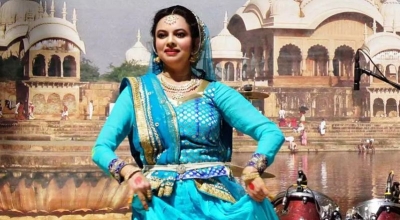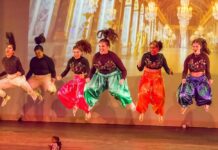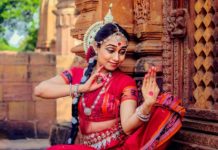BY N. LOTHUNGBENI HUMTSOE
New Delhi– It is tough to comprehend how yoga and meditation can be included in Kathak Dance, which is a completely different form. However, it is possible, believes Paramita Bhattacharyya, an internationally famous Kathak exponent with several accolades from India, the United States, and London, who is headquartered in Los Angeles, California.
Bhattacharyya, is passionate about introducing Indian Classical Dance Form ‘Kathak – Storytelling Art’ to the world arena, tells IANSlife, “Both dance and yoga are ancient Indian cultural forms entwined as complementary to one another. When a practitioner reaches a certain stage, dance becomes meditative.”
Continue reading to learn why and how she views Yoga and Meditation as an addition to the Kathak Dance discipline.
How have Yoga and Meditation influenced Kathak Dance?
Paramita: The daily practice of Kathak takes us through all eight stages of Yoga namely Yama, Niyama, Asana, Pranayama, Pratyahara, Dharna, Dhyan, and Samadhi. In Kathak, almost the entire gamut of asanas are performed. Finally, we reach a stage when we start hearing music within ourselves and get completely oblivious to our surroundings, then when we are on way to reaching the seventh and eighth stages, comes a complete meditation stage.
What are the primary styles of Yoga & Meditation Kathak classical dance? What distinguishes it from traditional classical dance?
Paramita: There is no difference since Kathak belongs to the ancient classical dance forms with inexplicable movements and Yoga, on the other hand, is also an ancient meditation practice. The combination of the two practices results in Kathak Yoga, a perfect union of mind and body. Each cell and nerve of the body is engaged during this form. Performing Kathak Yoga also involves a lot of breathing patterns, similar to meditation.
How does Yoga help to enlighten Indian Classical Dance ‘Kathak’?
Paramita: I have been practicing Kathak Meditation with yoga for over twenty-five years now. I start my day with at least eleven rounds of Surya Namaskar and Pranayama practice.
Pranayama is best seen in Kathak in the practice of epadhant’ rhythmic utterances by the dancer herself immediately after performing a strenuous energetic rhythmic pattern where a lot of energy has been expended. One has to recite the next rhythmic pattern without any trace of panting.
How does a dancer or yogi channel their body craft to bring healing, happiness, body-soul harmony, and oneness with the Supreme?
Paramita: Yoga definitely helps in channelizing energy by keeping the body healthy and calming the mind. The use of breath and linking breath to movement helps in keeping physically fit while different pranayama-breathing techniques and dhyana-meditation make it centered and calm, which is essential for any person who is in the field of art and creativity. The yogic lifestyle provides immense energy, which brings the mind into eyes’ mode and this positive outlook makes one successful in all endeavors. Personally, I feel that my creativity is honed due to Pranayam and Dhyan, not only in the dancing field but in music too. Yoga helps in exploring the source of untapped energy and unexplored talents and above all makes one in sync with the supreme power.
How does kathak yoga transform the practitioner’s mental and spiritual wellness if it is included into daily sadhana?
Paramita: I start my day with at least eleven rounds of Surya Namaskar and Pranayama practice. Yoga definitely keeps the body healthy and calms the mind. The use of breath and linking breath to movement has helped my dance practice immensely. In addition, yoga has improved my flexibility and mental balance over the years. Regular practice helps in developing mental clarity, calmness, alertness, and enthusiasm and also sharpens concentration. My students learn basic asanas as part of their dance training.
Is it accurate to state that kathak yoga encourages practitioners to pursue spirituality?
Paramita: Yes, of course, Dance with yoga and meditation or Kathak yoga whatever you want to call it, this is an art that gives peace or Anandam to the soul created by Lord Shiva.
Kathak Yoga requires a lot of practice. Once you ace this, the journey that you are on will make you in complete harmony with your inner self. While you practice this wonderful art, it acts as meditation in motion. Imagine this, you have worn your ghungroo, the sound attracts you, and at the same time, you are singing the melody with tihais. The entire time you perform this, you are in rhythm, and you are balanced, it acts as a oneness of body and mind. An hour of Kathak Yoga will help you perspire, and release toxins from the body, you start feeling light-hearted, & this transition takes you to a meditative state and prepares you for healing.
Please share insights from ancient history on Yoga & Meditation Kathak Dance Form.
Paramita: Historically, both yoga and Indian classical dance traditions share Vedic roots in the ancient texts of Patanjali Yogasutra and Natyashastra, respectively. Their connections range from mudra to mokshya. For both, the body is a temple and the dance/asana is one’s prayer. (IANS)















